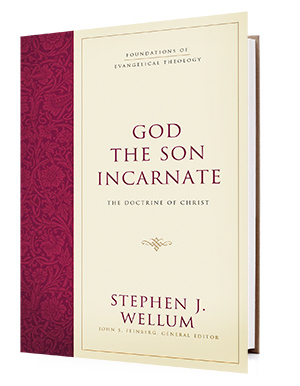God the Son Incarnate: The Doctrine of Christ by Stephen J. Wellum (CROSSWAY 2016, $40)
With the approaching of Easter on April 16, evangelicals can expect the annual parade of skeptics questioning the historicity of Jesus’ death and resurrection, not to mention his identity as the Son of God. But in a culture that values pluralism and dismisses the exclusivity of Jesus as presented in Scripture, the church must hold fast to its confessional Christology, writes Southern Seminary theology professor Stephen J. Wellum in God the Son Incarnate.
“Orthodox Christology remains the most faithful to the biblical presentation of Christ and the most coherent theological formulation of his identity and significance,” Wellum writes in the introduction. “Such a classic Christology, however, must be articulated amid a new cultural disposition toward Christ and defended against current challenges born out of confusion regarding the identity of Christ.”
As part of Crossway’s Foundations of Evangelical Theology series, Wellum’s volume equips the local church with a robust Christology for both clearer gospel proclamation and personal edification in Christ. Wellum integrates epistemology with biblical theology and church history, concluding with a contemporary defense rooted in the classic confessions.
Wellum confronts both the epistemologies of historical Jesus research and secular pluralism, which reject Scripture as the authoritative source for knowledge about the identity of Christ. In response, he argues for a Christology “from above,” using biblical theology as the foundation for formulating a theology and apologetic that is orthodox and defensible against contemporary challenges.
In his presentation of biblical theology, Wellum demonstrates how the “epochs of creation, fall, redemption, and inauguration-consummation shape the way the Scriptures present and identify Jesus” as one who came forth from the covenant relationships God established with Israel. Furthermore, the self-identification of Jesus in the Gospels and the testimony of the apostles throughout the New Testament provide inerrant and authoritative witness that Jesus is God the Son incarnate.
“The all-glorious Creator-Covenant Lord assumed a full and sinless human nature, such that the eternal Son became a man in order to restore humanity to its vice-regent glory and to inaugurate the new creation, over which the new humanity will rule in righteousness in the age to come,” Wellum writes. “In this way and by these glorious means, our Lord Jesus Christ becomes our great prophet, priest, and king, the head of the new creation, the Lord of glory, who is worthy of all our worship, adoration, and praise.”
Wellum then offers ecclesiological warrant for our Christology by surveying church history, particularly how the Councils of Nicaea and Chalcedon refuted heresy and provided a guide for Christians today for articulating orthodoxy. Heresy drove the church to become precise in its Christology, and Christians must remain within the boundaries set forth under the ministerial authority of church tradition.
The primary focus of Wellum’s examination of contemporary challenges is the infiltration of kenoticism in American evangelicalism. Both in its ontological and functional streams to varying degrees, kenoticism teaches “the Son ceased to possess certain attributes of deity in order for him to become truly human.” Wellum appeals to extra Calvinisticum (or extra Catholicum) to defend the orthodox truth that Jesus was not limited by his human nature but was active in exercising his divine power and authority. In his concluding chapter on apologetics, Wellum addresses the logical coherency of Christology and questions regarding Christ’s knowledge and his ability to be tempted.




